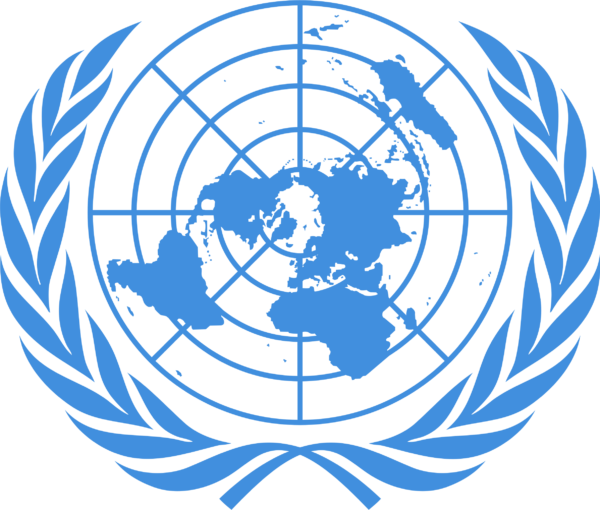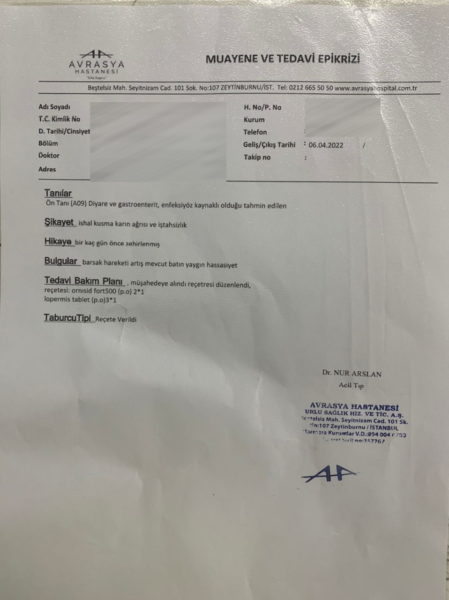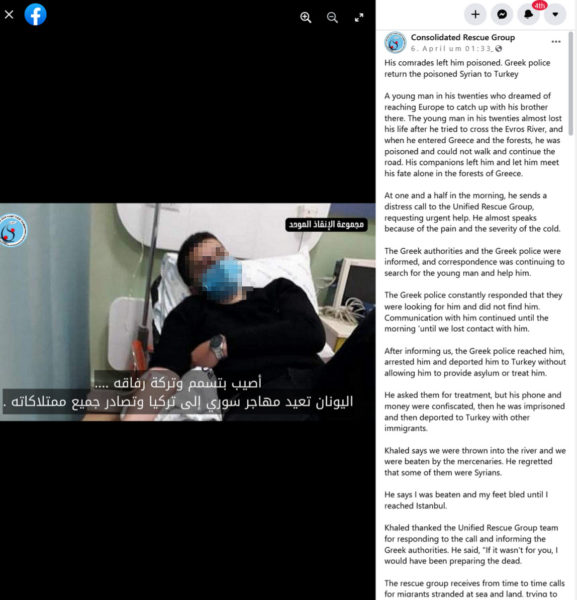Reclaimer: Due to severe food poisoning the respondent was in a very critical health condition at the time of the pushback. Therefore, accuracy of information on location might be reduced.
On April 3rd, 2022 at around 7:30 p.m. the respondent and about 50 other people on the move (POM) were pushed back from Greece to Turkey. The respondent is a 22-year-old Syrian man and this is the first pushback he experienced.
The respondent traveled from Gaziantep to Istanbul on March 30th, 2022, and met the other members of his initial transit group. The group consisted of six Syrian men in their 20s. The transit group crossed the border into Greece at around 9 p.m. on March 30th, 2022.
The Greek side of the river looked similar to the Turkish side and was also described as “coast-like” but without any trees and just with an agricultural field ahead. When they arrived there, the group started using the maps application on their phones and the GPS points they had set. Their plan was to walk all the way to Thessaloniki and subsequently continue their journey from there to Europa via Albania.
The group walked for three nights and rested in the forest during the day. Although they carried tents they only slept in sleeping bags as the terrain did not allow them to put them up their tents, and they were afraid to go to more spacious areas. The respondent recounted: “We only slept for a few hours at all. We were too afraid.”
At 8 p.m. on April 1st, 2022, after resting for the day, the group ran out of water. They started walking and found a spring in the forest. They filled their bottles and drank from it and continued walking in the direction on Thessaloniki.
The respondent started to feel physically unwell and his physical condition deteriorated dramatically within the next three hours. He started to throw up excessively and felt “terribly tired” and could not walk anymore. He was sure he got poisoned by the water.
The group left him alone in the middle of the forest at around 12 p.m. on April 1st, 2022.
He described the place where he was left as covered in trees and close to a kind of mountain and a valley “on the other side” close by. At this point, he still had his smartphone and communicated with his family in Syria. He sent them videos of himself in the forest, of which a screenshot is included below, Image 1. Also, he carried some medication which he took but his physical condition did not improve, “Whatever I was drinking or eating, I was throwing up!”.
He stayed in the same place. “I was alone in the forest for 2 days and it was such a terrible time. There were terrifying sounds [of animals] around me, which got worse at night. I was sure – ‘I will die here.’”
![]()
Image 1: Screenshot: the respondent in the forest, made unrecognisable
After two days, on April 3rd, 2022, he used his phone to search for possibilities to get help as he feared for his life. On Facebook, he contacted Consolidated Rescue Group (CRG) , an independent NGO receiving calls of people in distress on land and sea and contacting the authorities on their behalf. He contacted them on April 3rd, 2022 at 1:15 a.m., sharing his coordinates and explaining his situation, and stating that he wanted to be helped by the authorities. They reportedly responded immediately, contacted the Greek authorities and shared a post consisting of his location and reinforcing the call for help. The post can be found here or under Image 2, and the therein shared coordinates (41.370674, 26.296064) lead to this location in the Greek Soufli Municipality.
![]()
Image 2: Screenshot of Consolidated Rescue Group facebook post at 6:25 of 03.04.2022 (automatic translation). Names and profile pictures have been made unrecognisable.
The respondent waited until 6:39 a.m. – this is the time indicated as “last seen” on his WhatsApp profile. Then, “the ‘commandos’ came”. He explained the term as referring to men in armoured uniform, “similar to the American army ‘commandos unit’”. Further, he described the four men as wearing black uniforms with “police” writing on the back and a flag resembling the Greek flag on the sleeve, carrying small weapons in the holster, holding batons, and wearing balaclavas.
Two of the uniformed men reportedly approached the respondent in a very harsh and aggressive way, speaking to him in English. As he only speaks Arabic fluently, he did not understand most of what they were saying. Among each other, the men spoke Greek. He recalled telling them in English that he was sick and needed an ambulance but they did not provide any first aid and ignored his request.
He understood from their gestures and the few words of English he knows that they asked him to give his phone to them. They signalled (and said): “If you don’t give it, we will beat you”. He was forced to unlock his phone and hand it over.
The respondent recounted:
“When I was put in the car I realised that they have many phones and power banks in there. When one of the men took a cigarette from his pocket I saw that he had many euro [bills]. I think they took it from people [on the move] before.”
According to the respondent, when he opened his backpack to hand over his personal belongings and gather his things, he was beaten with a baton. The respondent noted that he thinks the men in uniform thought he had contagious disease which is why he was spared further direct physical contact and violence.
The respondent was brought to a car parked a few metres at around 7 a.m., by two of the uniformed men who treated him harshly. The car was described as a white Nissan Pick-Up with “police” written in blue on it. The small trunk of the vehicle was covered and the respondent was forced to crouch in there. He could not see anything and there was little air, he recalled.
They drove for more than half an hour until they arrived at a detention site.
He described the site as consisting of a small one-storey building with white and blue walls and a yard with dirty ground surrounded by a barbed-wire fence. The landscape reportedly consisted of some trees and a paved road next to the detention site territory. The respondent described the detention site as being about two kilometers from a village.
Inside the fence “many vans”, about 10, were parked. Most of them were white and at least two were blue. The respondent noted that it was the kind of van you can open from the back with two big doors but could not remember a specific brand.
Additionally, he illustrated that there were three garbage containers on the territory of which each was filled with shoes, clothes like jackets and shirts, and one with pants. He stated that he is sure these clothes belonged to other members of transit groups that had had their belongings taken from them. There was no flag, sign or writing indicating that the facility was an official detention centre, reported the respondent.
Inside the building five men in uniform were present. They were described as wearing “normal” black uniforms with long sleeves and “police” writing on the back. They wore pants “with big pockets” and balaclavas. The respondent noted that two of the men spoke Arabic and he remembered their voices as also being involved in the pushback he was subjected to later that day as well. He further stated that he believed these men were probably third-country nationals who tried to cross the border themselves before and were hired by Greek authorities. He clarified that he heard about similar incidents before which led him to this conclusion.
He was searched and forced to undress, left with only a t-shirt and boxers.
“They [the men] wanted everything from me, this is why they searched me”, he said. Reportedly, his bag, all his personal belongings, shoes, jackets, and pants were taken from him and nothing was returned.
After the search, he was put in a single cell at around 8 a.m. Next to him there was another cell with many other people inside. He believed that he was put in a cell alone because the men in uniform thought his illness might be contagious and dangerous. The cell was described as very dirty with no windows and a toilet that was “super disgusting” and without water. He had to sit on the ground if he wanted to rest.
He was not offered any medical treatment or water or food. “I asked for clean water because I was so sick and dehydrated but they just said ‘no’”.
At around 4 p.m. on April 3rd, the other people were taken out of their cell. The men in uniform at first did not open the respondent’s cell and he was afraid they would forget him in there so he started to scream to be noticed. Subsequently, he was also taken from his cell and told to “come and go with them [the other POM]”.
The group exiting the other cell consisted of 50 – 60 persons, including four to five women in their 30s and at least two minors. The respondent remembered people being from Syria, Afghanistan, Egypt and Morocco and their ages ranging from 10 to about 40 years old.
The same five men in black uniforms wearing balaclavas who searched the respondent earlier that day waited outside of the cells and took the people to a car. Reportedly, while they were passing through, all the transit group was beaten with batons; there was also one uniformed man who beat the women. Minors were not beaten but panicked due to the intensity of the situation.
Everyone was put into the trunks of two olive green or khaki military trucks. He stated that the vehicles were very old and the trunk or trailer of the vehicles was covered by some kind of perforated metal. The trunk measured about four x two metres. After about 5 minutes the vehicles started moving. The group was driven for about one to one and half hours, and the respondent described the driving as “really fast”. He recounted:
“There was nearly no oxygen because it was so crowded. Some of us started knocking on the metal cover from inside because they couldn’t breathe. Sometimes the driver used the brakes suddenly to make people fall on purpose.”
At around 5:30 p.m. the two vehicles, loaded with the entire transit group, arrived at a spot by the Evros river in the midst of agricultural fields. With them, more cars arrived, namely a white old Mercedes van and two Nissan Pick-ups resembling Greek Police Pick-Up trucks. In the white van five more men wearing the same “normal” black uniforms with long sleeves and “police” written on the back, wearing balaclavas, arrived. The respondent could not give details about the number of uniformed personnel arriving in the pick-ups but stated they all wore the same uniform.
In total, around 15 men in uniform were present at this pushback point. All of them wore the same uniform as described above, including balaclavas.
Reportedly, nine of them spoke Greek amongst each other and six spoke Arabic with a Syrian accent and Kurdish. The respondent referred to the Arabic speaking uniformed men as mercenaries, and stated they would do anything for money and carried out the “dirty work”. They were the ones who were actively pushing back the transit group across the river.
They were only to be distinguished by their language as they wore the exact same uniform as the Greek-speaking men, including the weapons they carried in the holster.
The transit group were then forced to kneel down and sit in rows of four people each. In this humiliating way, they were reportedly searched by the Arabic-speaking men and forced to undress, one by one, again. The women and minors were also searched by the men but not undressed. Any personal belongings which had not been taken away before, were taken at this point. The treatment was described as harsh and rude:
“When they searched us and found out that someone was hiding something, they beat them. When someone moved or made a sound, they beat them.”
Subsequently, the transit group was pushed over the river with the use of three silver-coloured rubber boats with paddles, which were brought to the pushback site in the white van. The time of the pushback was at sunset, at around 7:30 p.m. on April 3rd.
First, the Arabic-speaking men checked the Turkish side for soldiers, then, after discerning that no one was around on the other side of the river, eight people and two drivers were respectively sent in one boat.
The respondent recalled being sent in the first group with the women and children because he was so sick. Apart from the last boat, all people were taken across the river until they reached Turkish territory. When the last boat was crossing the river the boat drivers spotted Turkish authorities approaching and forced the people to jump into the water and swim to the Turkish side of the river.
According to the respondent, a Turkish military car arrived at the other side of the river, staffed with four people referred to as “ordinary soldiers” and one “general” (a military personnel apparently in charge). These men reportedly checked the group and counted them and indicated that they should walk on an unpaved road until they arrived at a village. The military vehicle accompanied the group for about one kilometer until they arrived at this village, which the respondent was unable to identify. The person referred to as “general” contacted the muhtar of the village (the elected head of Turkish villages/communities) who opened the Mosque for the group at around 9 p.m. The respondent was unable to give details about the village or the mosque, apart from it being located on a square with a yard and a statue of Atatürk in front of the building.
He explained the lack of detail in his memories was due to his very critical physical health condition at this time.
Once in the Mosque, the muhtar provided the members of the transit group with food boxes, like lunch packages, with a logo of the United Nations, identified by the respondent as similar to the logo displayed in Image 3. They contained two bottles of water, biscuits and canned beans.
The respondent recounted: “Everyone was so tired and thirsty – some of them spent five days in detention in Greek, without food or water”. He himself was still unable to eat or drink anything because he was so sick and would throw up everything he would take in.

Image 3: Logo of the United Nations
The people stayed in the Mosque for about one hour until about 10 p.m. Meanwhile, the muhtar had contacted taxi drivers to pick them up. “We were charged for it and they charged us a lot” – according to the respondent, the taxi drivers took advantage of their situation.
The respondent was in a taxi with seven other people and they drove back to Istanbul over the course of around three and a half hours. Each person was dropped at their house or a place where they could find money to pay him – 700 Turkish lira each. The respondent was taken to a friend’s house and arrived there very late in the early hours of April 4th.
At no point during the pushback was the respondent provided with medical help, regardless of actively asking for it and being in a critical and life-threatening condition.
Once in Istanbul, as his health condition remained critical, he went to a hospital. He was diagnosed with food poisoning (see Image 4) and provided with medical treatment.

Image 4: Medical document from Istanbul hospital, attesting food poisoning
He got in touch with the Consolidated Rescue Group again which shared a follow up post, as depicted below (Image 5).

Image 5: Follow-up post by Consolidated Rescue Group showing the respondent in a hospital in Turkey (automatic translation)
